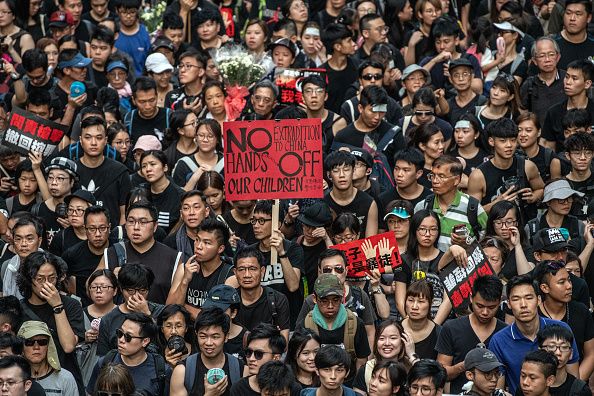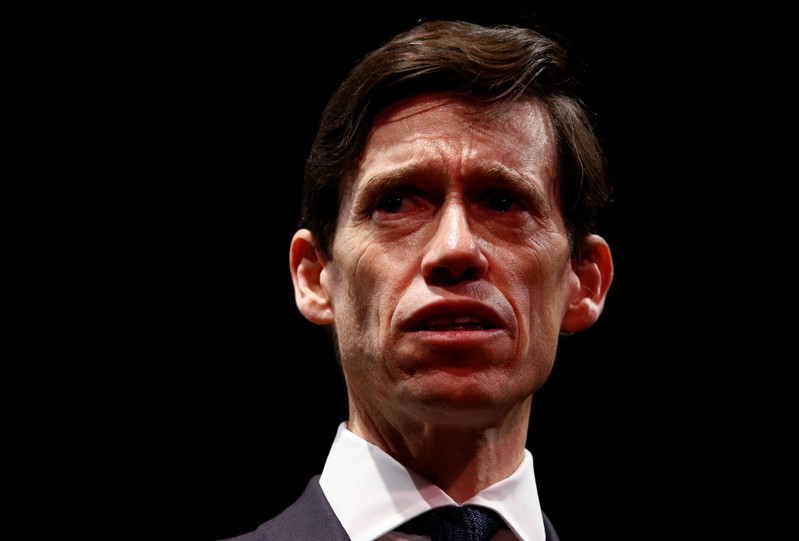
Protesters demonstrate against the suspended extradition bill in Hong Kong. Large numbers of protesters rallied on Sunday despite an announcement a day earlier by Hong Kong’s Chief Executive Carrie Lam that the controversial extradition bill will be suspended indefinitely.
Carl Court | Getty Images News | Getty Images
Massive crowds took to the streets of Hong Kong on Sunday in a rally which organizers say drew almost 2 million people to demand the city’s top official resign a day after she suspended — but did not withdraw — unpopular legislation to allow extraditions to China that opponents say must be scrapped.
Citizens, many dressed in black, packed subway carriages as they made their way to participate in the march beginning in the late afternoon in hot, muggy weather. It followed a similar one last Sunday in which hundreds of thousands turned out. Crowds also lined up to take ferries across the city’s famed harbor to join the demonstration.
The crowd estimate made in a statement by the Civil Human Rights Front, the pro-democracy political advocacy group that organized the protest, was almost double what it gave for last week’s. Police, however, announced a considerably lower count, estimating a peak size of 338,000 people, but qualified that by stressing the figure was for the “original agreed procession route,” an indication it did not fully represent the overall scale of the event.
The discrepancy was also wide last week when the organizers said a little over one million participated, while police counted 240,000. A reported 500,000 people protested against a proposed security law — also linked to China — in 2003.
Buses drive through crowds of protesters outside the Legislative Council building as they demonstrate against the now-suspended extradition bill on June 16, 2019 in Hong Kong.
Carl Court | Getty Images
Huge crowds snaked along the approved thoroughfare on skyscraper-laden Hong Kong Island but others spilled over into adjacent streets. Marchers held numerous signs including ones demanding that Chief Executive Carrie Lam quit, with others denouncing the extradition proposal and alleged police brutality. “Stop killing us,” read one.
Marchers also chanted slogans such as “withdraw it” in reference to the legislation.
A police spokeswoman told CNBC the force had no information on any arrests or violence related to the protests.
‘Apologized to the people’
Lam had vowed to press ahead with amendments to local law to allow extraditions to places with which the city has no such arrangements — including mainland China, where many in Hong Kong fear possible entanglement with its courts.
But citing injuries to police and protesters in demonstrations that turned violent Wednesday and what Lam called divisions in society wrought by the plan, she announced Saturday at a press conference she was putting the legislation on indefinite hold.
And while refusing calls to step down, on Sunday she offered an apology — via a government spokesperson — after avoiding one the day before.
Protesters demonstrate against the now-suspended extradition bill on June 16, 2019 in Hong Kong.
Carl Court | Getty Images
In a statement, the spokesperson said that Lam “admitted” that the government had caused “disappointment and grief” to Hong Kong’s people. “The chief executive apologized to the people of Hong Kong for this and pledged to adopt a most sincere and humble attitude to accept criticisms and make improvements in serving the public.”
Many in the Asian trade and finance center of 7.4 million people oppose the extradition plan, worrying their legal system and freedoms – legacies of the territory’s history as a British colony – would be compromised by closer judicial ties with China.
Hong Kong was guaranteed a high degree of control over its own affairs for at least 50 years under a “one country, two systems” arrangement when Britain ceded sovereignty to China on July 1, 1997. But local unease over increasing mainland influence has steadily grown.
A crowd of protesters marches in Hong Kong, part of an anti-government demonstration demanding the withdrawal of proposed legislation that would allow extraditions to mainland China. Hong Kong, June 16, 2019.
Kelly Olsen | CNBC
Foreign business groups and governments, including the United States, also oppose the extradition plan, stressing concerns that any erosion to Hong Kong’s legal system could make it a less attractive place for banks and companies to operate.
Lam and other government officials repeatedly offered assurances that adequate safeguards would guarantee protection from possible human rights abuses and that only fugitives accused of serious crimes could be extradited. The government also eliminated a number of economic-related offenses from the bill to lessen concern in the business community.
China supported the plan and said that Hong Kong’s rights and freedoms are safe.
But demonstrator Man-lok Ng said Hong Kong’s people faced exposure to China’s legal system and, thus, danger.
“So anyone of us could be at risk if this bill would be passed,” he told CNBC.
The mood on Sunday was one of anger at Lam but also sorrow after the death of a protester on Saturday after he reportedly fell from the top of a shopping mall where he had unfurled a banner demanding the plan be withdrawn.
Mourners hold candles during a candlelight vigil to commemorate a protestor who died during a rally against a controversial extradition law proposal on June 17, 2019 in Hong Kong.
Anthony Kwan | Getty Images
Ahead of the protest, hundreds of people paid their respects at a makeshift memorial set up outside the mall, offering flowers, prayers and incense. Numerous marchers carried white flowers they planned to offer when passing by.
Kelly Wong, who thinks Hong Kong is completely under China’s control, said she felt “angry” at Lam for saying she would listen more to the opinions of citizens but with the aim of still eventually passing the bill.
“So I think we should come out and express our voice,” Wong said near the memorial before the protest.
Sunday’s demonstration marks a week of anti-government protests that included scenes of violence — especially on Wednesday – that are rare in Hong Kong.
Crowds on that day estimated by police at more than 10,000 people surrounded the local legislature to stop debate on the bill.
‘Hong Kong is still alive’
It was initially peaceful but riot police later repeatedly fired tear gas and rubber bullets into crowds and some protesters clashed with officers and threw objects at them. Many were angry at the response of law enforcement, though Hong Kong’s police commissioner told reporters it was justified.
Protesters shine lights from their mobile phones during rally against a controversial extradition law proposal on June 16, 2019 in Hong Kong, China.
Billy H.C. Kwok | Getty Images News | Getty Images
Lam called the scenes an “organized riot,” words that angered many.
“There was no riot,” read signs carried Sunday.
While protesters expressed anger at Lam, the scale of the demonstrations seen over the past week led some to concede that Hong Kong’s citizens still had the ability to make an impact.
“I think Hong Kong is still alive,” said 16-year-old Nicholas Yan, adding that is because its people still “have a chance” to save it from danger.
— CNBC’s Yolande Chee contributed to this report

